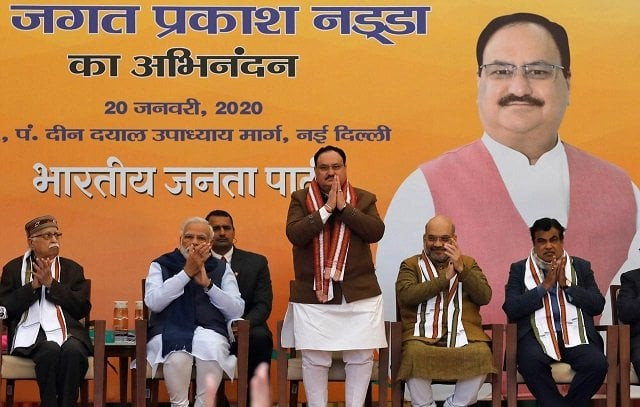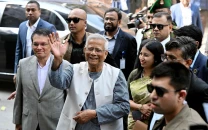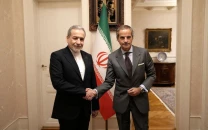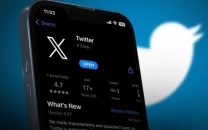India's ruling party picks new president as challenges mount
Jagat Prakash Nadda will become new head of BJP replacing Amit Shah

Jagat Prakash Nadda (C), newly elected President of India's ruling BJP, gestures after taking charge as the president during a ceremony at the party's headquarters in New Delhi, PHOTO: REUTERS
Jagat Prakash Nadda, who rose through the ranks after cutting his teeth as a student leader in the 1970s, will become the new president of the Bharatiya Janata Party (BJP), replacing Amit Shah, currently India’s Home Minister.
Nadda was elected unopposed, the party said.
Led by Modi and Shah, the BJP returned to power, winning in a general election in 2019 by a landslide majority, but the party has failed to keep its hold on a number of key Indian states amid growing criticism over some of its recent moves.
Since late 2018, the BJP has lost control of the western states of Rajasthan and Maharashtra, Jharkhand in the east and Chhattisgarh in central India - shrinking its national footprint, even though Modi’s popularity seems largely undiminished.
A wave of countrywide protests over a new citizenship law that has continued for more than four weeks has also caught the party on the wrong foot, adding to concerns about a flagging economy and rising inflation.
With some of India’s largest states going to the polls in the next two years, Nadda will have to balance the outsized influence of Modi and Shah alongside crafting an electoral strategy to improve the BJP’s performance.
“Electorally, the BJP is going to have a tough cycle,” said Rahul Verma, a fellow at New Delhi think-tank Centre for Policy Research. Next month, Delhi elects a new state assembly and the BJP is widely seen to be trailing behind an incumbent local group headed by a feisty leader.
Nadda first joined the student wing of the Rashtriya Swayamsevak Sangh (RSS) - the nationalist group that spawned the BJP - before moving into electoral politics in the 1980s, and subsequently working alongside Modi in the early 1990s.
During Modi’s first term, Nadda served as the federal health minister. He was then left out of Modi’s cabinet, after the prime minister returned to power, and moved back to the party full-time as its working president last June.
Since then, Modi’s government has moved quickly to fulfil a number of electoral promises, including removing special provisions on the Occupied Kashmir region, gaining legal approval for building a temple at a contested site in the northern city of Ayodhya, and introducing a new citizenship law.
But the moves have hardened opposition against the party, with many Indians, including a section of Muslims, accusing Modi of pushing a Hindu-first agenda.


















COMMENTS
Comments are moderated and generally will be posted if they are on-topic and not abusive.
For more information, please see our Comments FAQ